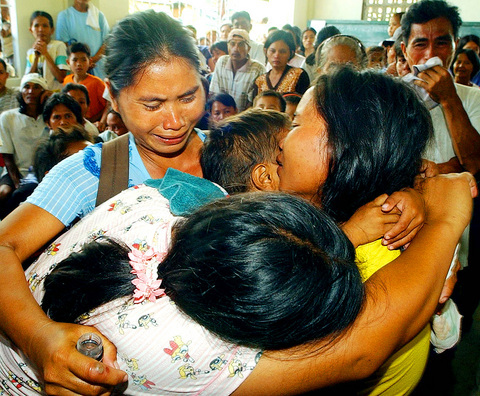Grieving parents prepared for a mass burial yesterday of at least 27 schoolchildren who died after eating cassava -- a root that's poisonous if not prepared properly -- while 103 other people were hospitalized with severe stomach pain and diarrhea.
The victims, mostly aged 7 to 13, purchased the deep-fried caramelized cassava from vendors during snack time at the San Jose school in Mabini on Bohol island.
One of the two vendors also was sickened, and she remained in hospital yesterday while the other was in police custody to protect her from outraged parents, said Philip Fuderanan, the mayor's aide.

PHOTO: AP
Investigators were checking whether the vendors failed to properly cook the cassava, and looking into unconfirmed reports that tainted cooking oil was used to fry the food, Health Secretary Manuel Dayrit said.
President Gloria Macapagal Arroyo said that she was "deeply saddened" and went yesterday to Mabini to console grieving parents and declare an emergency for the province so that it could draw emergency funds to assist victims' families.
"I pray to God that this will never happen again," Arroyo said in a statement. "I want the police to work with the health authorities to give me a detailed report on why and how this unfortunate incident happened."
Wailing parents left hospitals late Wednesday carrying bodies of their children wrapped in blankets, and Mabini Mayor Stephan Rances said a mass burial was planned for yesterday.
Francisca Doliente said her 9-year-old niece was given some of the cassava by her friend, then fell sick and was undergoing treatment.
"Her friend is gone. She died," Doliente told reporters.
The starchy roots of the cassava plant, a major crop in Southeast Asia, are rich in protein, minerals and vitamins A, B and C. However, it is poisonous without proper preparation. Eaten raw, the human digestive system will convert part of it into cyanide. The victims suffered severe stomach pain, then vomiting and diarrhea.
They were taken to at least four hospitals near the school in Mabini, about 610km southeast of Manila. Treatment was delayed because the nearest hospital was 30km away.
"Some said they took only two bites because it tasted bitter and the effects were felt 5-10 minutes later," said Dr. Harold Gallego of Garcia Memorial Provincial Hospital in the town of Talibon, where 47 patients were taken.
Dayrit said 27 students were confirmed dead. The vast majority of the 103 people recovering in hospital were schoolchildren, and four of them were in critical condition, hospital workers said. Those who had reached hospitals had a good chance of surviving, doctors said.
Officials of the National Bureau of Investigation and the Health Department were collecting samples of cassava at the site and drawing blood from patients for analysis, provincial health officer Reymoses Cabagnot said.
Grace Vallente said her 7-year-old nephew Noel died en route to the hospital and her 9-year-old niece Roselle was undergoing treatment.
"There are many parents here," she said from L.G. Cotamura Community Hospital in Bohol's Ubay town. "The kids who died are lined up on beds. Everybody's grief-stricken."

Auschwitz survivor Eva Schloss, the stepsister of teenage diarist Anne Frank and a tireless educator about the horrors of the Holocaust, has died. She was 96. The Anne Frank Trust UK, of which Schloss was honorary president, said she died on Saturday in London, where she lived. Britain’s King Charles III said he was “privileged and proud” to have known Schloss, who cofounded the charitable trust to help young people challenge prejudice. “The horrors that she endured as a young woman are impossible to comprehend and yet she devoted the rest of her life to overcoming hatred and prejudice, promoting kindness, courage, understanding

‘DISRESPECTFUL’: Katie Miller, the wife of Trump’s most influential adviser, drew ire by posting an image of Greenland in the colors of the US flag, captioning it ‘SOON’ US President Donald Trump on Sunday doubled down on his claim that Greenland should become part of the US, despite calls by the Danish prime minister to stop “threatening” the territory. Washington’s military intervention in Venezuela has reignited fears for Greenland, which Trump has repeatedly said he wants to annex, given its strategic location in the arctic. While aboard Air Force One en route to Washington, Trump reiterated the goal. “We need Greenland from the standpoint of national security, and Denmark is not going to be able to do it,” he said in response to a reporter’s question. “We’ll worry about Greenland in

PERILOUS JOURNEY: Over just a matter of days last month, about 1,600 Afghans who were at risk of perishing due to the cold weather were rescued in the mountains Habibullah set off from his home in western Afghanistan determined to find work in Iran, only for the 15-year-old to freeze to death while walking across the mountainous frontier. “He was forced to go, to bring food for the family,” his mother, Mah Jan, said at her mud home in Ghunjan village. “We have no food to eat, we have no clothes to wear. The house in which I live has no electricity, no water. I have no proper window, nothing to burn for heating,” she added, clutching a photograph of her son. Habibullah was one of at least 18 migrants who died

Russia early yesterday bombarded Ukraine, killing two people in the Kyiv region, authorities said on the eve of a diplomatic summit in France. A nationwide siren was issued just after midnight, while Ukraine’s military said air defenses were operating in several places. In the capital, a private medical facility caught fire as a result of the Russian strikes, killing one person and wounding three others, the State Emergency Service of Kyiv said. It released images of rescuers removing people on stretchers from a gutted building. Another pre-dawn attack on the neighboring city of Fastiv killed one man in his 70s, Kyiv Governor Mykola